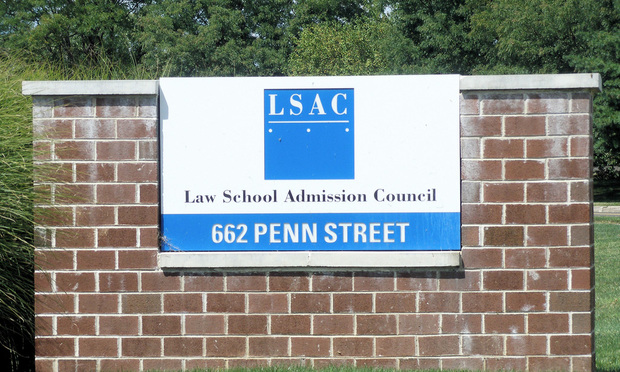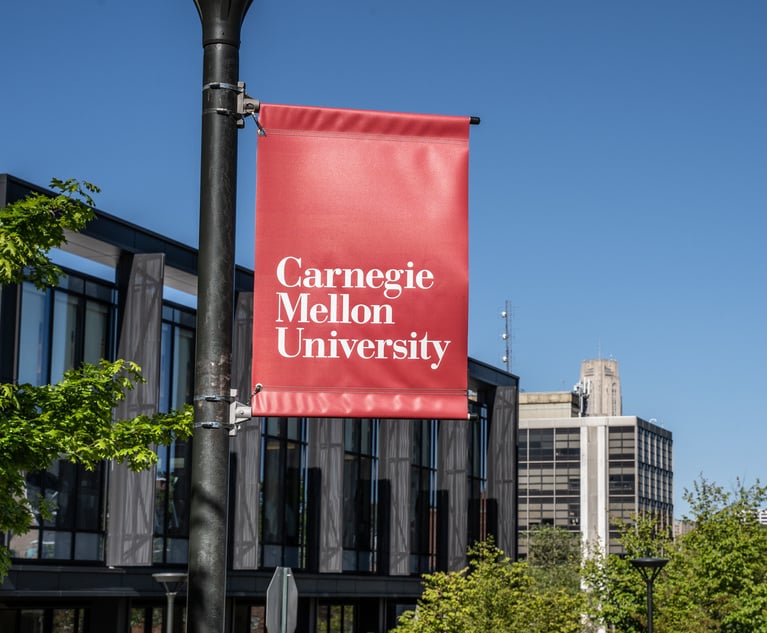3rd Circuit Revives Woman's ADA Lawsuit Over LSAT Accommodations
The U.S. Court of Appeals for the Third Circuit overturned U.S. District Judge Nitza I. Quinones Alejandro's grant of summary judgment in favor of the LSAC, based on the judge's ruling that plaintiff Jane Doe did not prove a concrete injury under the Americans with Disabilities Act.
November 04, 2019 at 02:36 PM
4 minute read
 Law School Admission Council welcome sign at 662 Penn Street in Newtown, Bucks County, Pennsylvania. The LSAC administers the Law School Admission Test (LSAT).
Law School Admission Council welcome sign at 662 Penn Street in Newtown, Bucks County, Pennsylvania. The LSAC administers the Law School Admission Test (LSAT).
A federal appeals court has reversed the dismissal of a pro se lawsuit filed by a woman with ADHD and dyslexia against the Law School Admission Council for denying her accommodations for LSAT testing.
The U.S. Court of Appeals for the Third Circuit overturned U.S. District Judge Nitza I. Quinones Alejandro of the Eastern District of Pennsylvania's grant of summary judgment in favor of the LSAC, based on the judge's ruling that plaintiff Jane Doe did not prove a concrete injury under the Americans with Disabilities Act.
Doe requested accommodations for testing but could not provide records from her time in school in the 1980s, since they had been destroyed, and could not afford a $5,000 diagnostic report to serve as proof of her disabilities.
"Doe's allegations show that her alleged injury is concrete, not speculative," Third Circuit Judge Stephanos Bibas wrote in the court's Nov. 1 opinion. "First, Doe's request for 'accommodated testing at the next available testing date' and her statement that it is her 'lifelong dream' to become a lawyer show that she plans to take some future LSAT with accommodations."
Bibas continued, "And when she does apply for accommodations, we know what will happen because it has already happened several times. Because Doe cannot provide the required documents, the council will neither grant nor deny her request, as it admits is its practice. When this happens, the parties will reach a stalemate. So her claims are 'sufficiently developed' and ripe for judicial review."
In an email Monday, Doe said she wants to become a lawyer so she can fight for disabled people.
"Our disability runs in my family," she said. "People always want to take advantage of an intellectually disabled person. That [is] why I want to go to law school to stop it."
LSAC's attorney, Robert A. Burgoyne of Perkins Coie in Washington, D.C., did not respond to a request for comment.
A spokeswoman for LSAC said in an email, "In this particular case, we have been prepared to review this candidate's request for accommodations from the outset, but unfortunately she has never provided any documentation in support of her accommodation request. The Court of Appeals recognized the need for supporting documentation, in affirming the lower court's denial of the plaintiff's motion for a preliminary injunction. We would welcome the opportunity to review any documentation that she can provide in support of her request for accommodation, and we will happily work with her to see that she receives any accommodation to which she is entitled."
Doe also requested an injunction against the LSAC in order to receive accommodations, but the lower court held that the issue was moot and that she was not likely to succeed on her claim anyway. While the Third Circuit reversed the court's ruling on mootness, it agreed Doe would not succeed in gaining an injunction.
"Doe's complaint is ripe and not moot, so the district court erred in dismissing it for lack of subject-matter jurisdiction. We will reverse and remand to let her complaint proceed. Though her preliminary-injunction motion is also not moot, she has not shown that she has a likelihood of succeeding on her claim that the council is wrongfully denying her testing accommodations," Bibas said. "So we will affirm the district court's denial of that part of her motion. But because the district court did not address Doe's challenge to the documentation policy, we will vacate and remand in part to let the district court consider this challenge in the first instance."
This content has been archived. It is available through our partners, LexisNexis® and Bloomberg Law.
To view this content, please continue to their sites.
Not a Lexis Subscriber?
Subscribe Now
Not a Bloomberg Law Subscriber?
Subscribe Now
NOT FOR REPRINT
© 2025 ALM Global, LLC, All Rights Reserved. Request academic re-use from www.copyright.com. All other uses, submit a request to [email protected]. For more information visit Asset & Logo Licensing.
You Might Like
View All
LSAT Administrator Sues to Block AI Tutor From Using ‘Famous, Distinctive’ Test Prep Materials
3 minute read
Disjunctive 'Severe or Pervasive' Standard Applies to Discrimination Claims Against University, Judge Rules
5 minute read
From 'Confusing Labyrinth' to Speeding 'Roller Coaster': Uncertainty Reigns in Title IX as Litigators Await Second Trump Admin
6 minute readTrending Stories
- 1'It's Not Going to Be Pretty': PayPal, Capital One Face Novel Class Actions Over 'Poaching' Commissions Owed Influencers
- 211th Circuit Rejects Trump's Emergency Request as DOJ Prepares to Release Special Counsel's Final Report
- 3Supreme Court Takes Up Challenge to ACA Task Force
- 4'Tragedy of Unspeakable Proportions:' Could Edison, DWP, Face Lawsuits Over LA Wildfires?
- 5Meta Pulls Plug on DEI Programs
Who Got The Work
Michael G. Bongiorno, Andrew Scott Dulberg and Elizabeth E. Driscoll from Wilmer Cutler Pickering Hale and Dorr have stepped in to represent Symbotic Inc., an A.I.-enabled technology platform that focuses on increasing supply chain efficiency, and other defendants in a pending shareholder derivative lawsuit. The case, filed Oct. 2 in Massachusetts District Court by the Brown Law Firm on behalf of Stephen Austen, accuses certain officers and directors of misleading investors in regard to Symbotic's potential for margin growth by failing to disclose that the company was not equipped to timely deploy its systems or manage expenses through project delays. The case, assigned to U.S. District Judge Nathaniel M. Gorton, is 1:24-cv-12522, Austen v. Cohen et al.
Who Got The Work
Edmund Polubinski and Marie Killmond of Davis Polk & Wardwell have entered appearances for data platform software development company MongoDB and other defendants in a pending shareholder derivative lawsuit. The action, filed Oct. 7 in New York Southern District Court by the Brown Law Firm, accuses the company's directors and/or officers of falsely expressing confidence in the company’s restructuring of its sales incentive plan and downplaying the severity of decreases in its upfront commitments. The case is 1:24-cv-07594, Roy v. Ittycheria et al.
Who Got The Work
Amy O. Bruchs and Kurt F. Ellison of Michael Best & Friedrich have entered appearances for Epic Systems Corp. in a pending employment discrimination lawsuit. The suit was filed Sept. 7 in Wisconsin Western District Court by Levine Eisberner LLC and Siri & Glimstad on behalf of a project manager who claims that he was wrongfully terminated after applying for a religious exemption to the defendant's COVID-19 vaccine mandate. The case, assigned to U.S. Magistrate Judge Anita Marie Boor, is 3:24-cv-00630, Secker, Nathan v. Epic Systems Corporation.
Who Got The Work
David X. Sullivan, Thomas J. Finn and Gregory A. Hall from McCarter & English have entered appearances for Sunrun Installation Services in a pending civil rights lawsuit. The complaint was filed Sept. 4 in Connecticut District Court by attorney Robert M. Berke on behalf of former employee George Edward Steins, who was arrested and charged with employing an unregistered home improvement salesperson. The complaint alleges that had Sunrun informed the Connecticut Department of Consumer Protection that the plaintiff's employment had ended in 2017 and that he no longer held Sunrun's home improvement contractor license, he would not have been hit with charges, which were dismissed in May 2024. The case, assigned to U.S. District Judge Jeffrey A. Meyer, is 3:24-cv-01423, Steins v. Sunrun, Inc. et al.
Who Got The Work
Greenberg Traurig shareholder Joshua L. Raskin has entered an appearance for boohoo.com UK Ltd. in a pending patent infringement lawsuit. The suit, filed Sept. 3 in Texas Eastern District Court by Rozier Hardt McDonough on behalf of Alto Dynamics, asserts five patents related to an online shopping platform. The case, assigned to U.S. District Judge Rodney Gilstrap, is 2:24-cv-00719, Alto Dynamics, LLC v. boohoo.com UK Limited.
Featured Firms
Law Offices of Gary Martin Hays & Associates, P.C.
(470) 294-1674
Law Offices of Mark E. Salomone
(857) 444-6468
Smith & Hassler
(713) 739-1250






